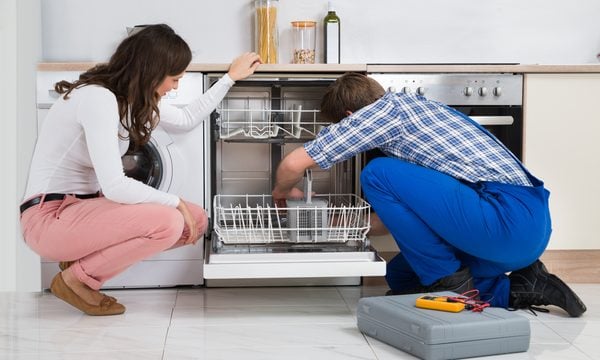Do You Need a Home Warranty? How to Decide
Homeowners don’t always need home warranties, but homeowners in these categories might want to consider getting one.

Some or all of the mortgage lenders featured on our site are advertising partners of NerdWallet, but this does not influence our evaluations, lender star ratings or the order in which lenders are listed on the page. Our opinions are our own. Here is a list of our partners.
Home warranties help pay for repairs to certain appliances and systems such as air conditioners. They usually come with monthly premiums and service fees, but home warranties never guarantee coverage, which means you could still end up paying out of pocket for repairs.
However, some homeowners might find a home warranty helpful, especially if they’re worried about paying for anticipated repairs.
» DIG DEEPER: Are home warranties worth it?
When a home warranty makes sense
You think your systems or appliances might stop working
If you think your appliances, air conditioning or heating system might break down in the next year, a home warranty might be worth considering if the repair or replacement costs more than the home warranty.
How it can save you money: Let’s say you’re worried about your dishwasher, which could cost about $350 to repair, and your microwave, which can run around $200 to repair . Paying $340 for a home warranty plan might save you money if it covers the $550 in repairs.
When it doesn’t make sense: If you’re only concerned about paying for less-costly repairs, for example a broken microwave, a home warranty might not save you money. Keeping with the example, a year of coverage for $340 would cost you more than the $200 repair.
You can’t cover the full cost of a repair or replacement
If you aren’t able to save the money to pay out of pocket to repair or replace an appliance or system, a home warranty might be the way to go.
How it can save you money: If saving enough money for a repair is beyond your budget, but paying a monthly premium for coverage is doable, a home warranty has the benefit of letting you pay less every month instead of more all at once.
When it doesn’t make sense: If you’re able to save enough to repair or replace a system or appliance, it could cost you more money to pay for a home warranty if the plan doesn’t cover your claim. In this case, you’d have to pay out of pocket for the repair plus pay the monthly premiums.
Advertisement
When to skip a home warranty
Your systems and appliances are relatively new and unlikely to malfunction
Having items that are well within their lifespan and show no signs of wear and tear might mean it’s better to hold off on a home warranty .
What to do instead of buying a home warranty: Start a maintenance fund for future repairs. Put the money you would’ve spent on a home warranty in a savings account. Set it up as an automatic deposit and it’ll feel the same as if you were paying a monthly premium for a home warranty.
Your appliances and systems are still under manufacturer warranty
Most manufacturer warranties are good for 12 months after purchase, and many home warranty companies won’t pay for repairs or replacements as long as items are under warranty by another third party .
What to do instead of buying a home warranty: Register your appliances and systems with the manufacturer to ensure it will repair them if they malfunction.
» MORE: What does a home warranty cover?
Your items are more than 10 years old and you don’t have records to prove they’ve been maintained properly
Most home warranty providers require that you regularly maintain your systems and appliances, and some can request years of maintenance records before approving a claim . If you aren’t able to prove that your older items have been well maintained, home warranty companies might deny a claim.
What to do instead of buying a home warranty: Research how to extend the life of your appliances and systems. For example, you can have an air conditioning company perform seasonal tune-ups to keep your HVAC system running longer .
You can save money to cover potential repairs or replacements
The simplest alternative to a home warranty is setting money aside for repairs. That way, you’ll have the money when you need it. If you’re able to do this, you could skip a home warranty.
Are you able to save for repairs? Even if you can afford to save to repair or replace your items, a home warranty might still be a smart move if you believe the company will approve your claims, and if fixing it yourself would cost more than the home warranty.
What to do instead of buying a home warranty: Put money into a savings account that is only for appliances and home systems, and save a bit more than you think you’ll need if you can. Make it so that the fund is obviously for repairs only — consider naming the account something like “Home Maintenance.”

How to know if a home warranty is right for you
The math makes sense
When looking at the cost of a home warranty, play out a few scenarios to see if you’ll save or lose money. For example, if you’re worried about your HVAC system breaking down, research the average cost of repairing your type of system and compare that with the cost of a year of home warranty coverage. Be sure to add in other fees you would pay, such as service fees.
» PLAN AHEAD: How to budget realistically for repairs
A backup plan for repairs makes you feel better
Even if you can afford to pay for repairs out of pocket, sometimes having a backup plan can give you peace of mind. If that’s the case, look at home warranty plans that have good coverage for the appliances or systems that worry you the most.
Most of the repairs you’ll need will meet your plan’s coverage
Home warranty companies don’t approve every claim. They may exclude an item or part if the item malfunctioned due to a lack of maintenance. But if you think the home warranty provider will approve the repairs and the reason for the repairs, a home warranty might be right for you.
What to know before buying a home warranty
Reading the coverage and exclusions information in your contract is one of the most impactful things you can do to avoid costly misunderstandings in the future. You have a right to read your contract before purchasing a plan, and it’s important to understand that home warranties:
- Always have exclusions to coverage, no matter what their sales pitches say. Read your contract carefully before purchasing a plan — especially anything listed as an exclusion or limit of liability. For example, a company might cover air conditioning systems but exclude certain parts or components, such as coils. Other companies cover plumbing repairs but won’t pay to clear all plumbing stoppages or repair certain types of leaks.
- Are not a type of insurance. Even though some companies call their service fees deductibles, home warranties do not work the same way as insurance policies. They differ in what they cover and how they pay for repairs or replacements. A home warranty is not a supplement for homeowners insurance.
- Limit how much they pay. If the cost of a repair or replacement goes beyond a limit stated in your contract, you’ll have to pay the difference. For example, if the bill for a repair is $2,000 and the limit is $1,500, you’re required to cover $500. This is in addition to your monthly premium and service fee.
- Can deny your claim for several reasons. Examples include if you had work performed on a covered item without approval or you modified the system or appliance.
- May not pay enough to cover the full cost of replacing a covered item. Home warranties often depreciate the value of items as they age, so you’ll likely have to pay at least some money to replace an item, even if it’s covered by the contract.
Article sources
NerdWallet writers are subject matter authorities who use primary,
trustworthy sources to inform their work, including peer-reviewed
studies, government websites, academic research and interviews with
industry experts. All content is fact-checked for accuracy, timeliness
and relevance. You can learn more about NerdWallet's high
standards for journalism by reading our
editorial guidelines.
- 1. Angi.com. How Much Does It Cost to Repair a Dishwasher? [2024 Data]. Accessed Apr 11, 2024.
- 2. Angi.com. Microwave Repair Costs in 2024: A Complete Guide. Accessed Apr 11, 2024.
- 3. Federal Trade Commission. Extended Warranties and Service Contracts. Accessed Apr 11, 2024.
- 4. University of Kentucky. Super Shopper: Service Contracts — To Buy or Not To Buy?. Accessed Apr 11, 2024.
- 5. American Home Shield. Home Service Plan Agreement. Accessed Apr 11, 2024.
- 6. Liberty Home Guard. LHG Sample Policy. Accessed Apr 11, 2024.
- 7. Select Home Warranty. Service Contract Terms & Conditions. Accessed Apr 11, 2024.
- 8. Angi.com. What Is an AC Tune-Up and Is It Necessary?. Accessed Apr 11, 2024.
More like this
Related articles
AD
50% OFF Select Plans — Limited Time Only
Call American Home Shield
REDEEM NOW
on American Home Shield's website
AD
50% OFF Select Plans — Limited Time Only
- Comprehensive Coverage from Just $29.99/Month;
- Trusted by Over 2 Million Members for 50+ Years;
- No Records or Home Inspections Required.
Call American Home Shield

REDEEM NOW
on American Home Shield's website
AD
Protect Your Home for as little as $1 / Day
Call Select Home Warranty
REDEEM NOW
on Select Home Warranty's website
AD
Protect Your Home for as little as $1 / Day
- Great Home Warranty Protection with $150 off + 2 Months Free + Free Roof Coverage;
- Join the Select Benefits Program and Save up to 75% on Common Everyday purchases.
Call Select Home Warranty

REDEEM NOW
on Select Home Warranty's website






